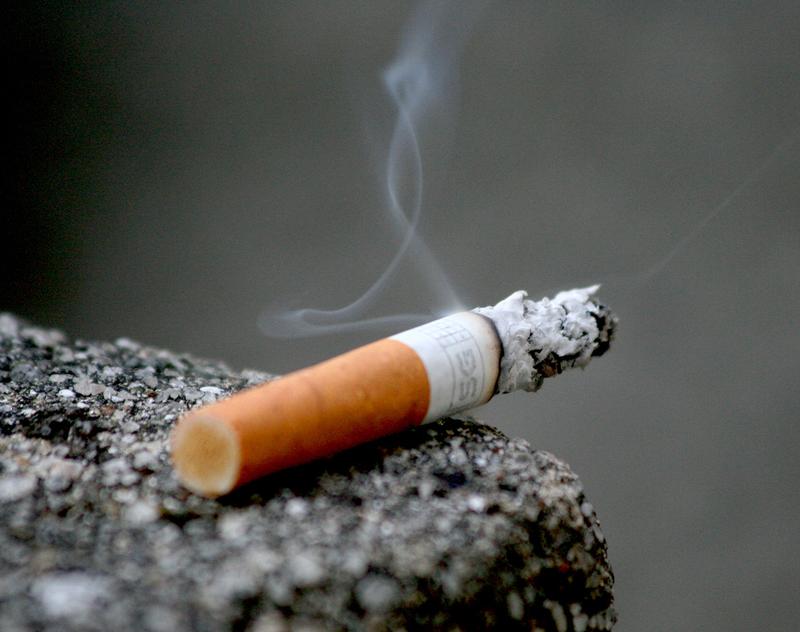
Welcome to Politics Bites, where every afternoon at It's A Free Country, we bring you the unmissable quotes from the morning's political conversations on WNYC. Today on The Brian Lehrer Show, City Councilmembers Daniel J. Halloran (R-19), representing Northeast Queens, and Robert Jackson (D-7), representing West Harlem, parts of Washington Heights, Inwood, Central Harlem, and Morningside Heights, explained their votes against the council's ban on smoking in parks, beaches, and pedestrian plazas.
The City Council passed a bill on Wednesday to ban smoking in 1,700 city parks and along 14 miles of city beaches and some pedestrian plazas. The bill passed by a 36-to-12 vote. It is the most significant expansion of anti-smoking laws in the city since the 2002 prohibition on smoking in restaurants and bars.
City Council members Daniel J. Halloran and Robert Jackson explained their votes against the council's ban on smoking in parks, beaches, and pedestrian plazas.
Councilmember Jackson started by acknowledging that the ban may have made for unlikely bedfellows, but that he sees Councilmember Halloran as a colleague, not a Republican.
We have fifty-one members of the City Council and each one has their opinions about certain things…I voted against the bill because I was looking for a compromise bill.. I just think that as a council, as a government, we are going too far in trying to control the lives of New Yorkers with all of the things that we’re doing.
Jackson himself does not smoke, but he finds it ridiculous that smokers walking through Central Park or on the Coney Island boardwalk might be ticketed. He also sees no value in the ban as a public health measure. He said that school with PCB contamination are a more pressing concern.
I do think that most adults know that smoking is not good for your health, just like they know that drinking is not good for your health, but I just think the government is going too far.
Halloran agreed that there are more significant health concerns that the Council is not addressing and thinks the danger of second-hand smoke exposure has been overstated.
The studies on second-hand smoke that we’ve been looking at, none of them — none of them — indicate that there is any greater health risk from second-hand smoke in open places like parks than there is from the trucks and the cars on the roads in the city of New York. So unless we're being intellectually honest about this and we’re going to start talking about banning the cars and trucks, this ban will actually not accomplish very much.
Even more worrisome for Halloran is his concern that the ban creates a “slippery slope of arguments." Following the last smoking ban in 2002, Halloran said Mayor Bloomberg’s office said it would not pursue further bans.
I can see looming on the horizon even worse controls, where we’ll be talking about the police state enforcing rules against households, against individual motorists, and there’s no end to this.
A caller from Manhattan voiced concern about the ban from a civil liberties perspective.
Who are going to be the enforcers of the law? I assume the police...I worry that you’ll wind up with selective enforcement. It gives police another excuse to approach people, question, and I think once again it will disproportionately fall on young black men in the city.
Jackson agreed that it is a legitimate fear, though he said that one of the compromises in the law is that the ban is to be enforced by park patrol, not NYPD. Halloran, a former attorney, was skeptical that the police department would refrain from using the ban as another reason to stop people.
Certainly if there’s a law on the books the police will seek to enforce it, especially if it’s collateral to other things that are going on and I think there is a real danger of youths in particular being subject to this, and because it’s an offense, the police will be able to stop, frisk, and do an inquiry, and that creates an interesting set of paradigms that is going to shock the progressives who voted for this bill, because they are going to see a corollary change in police behavior based on being able to use this as a predicate to open the door into inquiry.
Sheelah Feinberg from the New York City Coalition for a Smoke Free City called in to defend the legislation.
We feel really strongly that all New Yorkers have a right to breathe clean air. The US Surgeon General said there is no safe level of exposure to second-hand smoke, and that is where we come from on this bill.
Halloran challenged Feinburg that there were more pressing health concerns that the Council should address. Feinburg agreed that PCB's are a serious concern, but reminded the Councilmember that "we're here to talk about smoke-free parks and beaches."
Even though we have a fifteen percent smoking rate here in New York City — one million of our residents smoke — non-smoking new Yorkers have higher levels of cotinine than the national average, and that is a result of being around smokers and second-hand smoke. So we are above the national average.
Jackson said a compromise could have been reached in which some small areas were designated as smoking-allowed, but the proponents of the bill were unwilling to compromise.
I don’t think the people who moved this bill forward were willing to compromise. And that’s why I say that we’re moving toward a situation where the government is going to interfere in the lives of New Yorkers, and I’m not in favor of that.